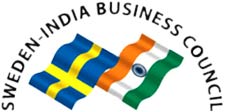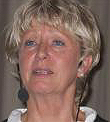SWEDISH SOUTH ASIAN STUDIES NETWORK
Successful Lund Seminar about
Business and Corporate Social Responsibility in India
On Thursday 10 April 2008, 12.00–17.00, SASNET and SIBC (Sweden-India Business Council) organised a business seminar in Lund in collaboration with the Ideon Science Park.
 Stig Victorin, Senior Advisor to SIBC, Anna Lindberg, SASNET Director, and Hans Möller, IDEON, were the driving organizers behind the seminar, that attracted about 50 participants, mostly from business companies and a few from Lund University.
Stig Victorin, Senior Advisor to SIBC, Anna Lindberg, SASNET Director, and Hans Möller, IDEON, were the driving organizers behind the seminar, that attracted about 50 participants, mostly from business companies and a few from Lund University.
The seminar was titled ”Operating in India” (Verksam i Indien), and included presentations focusing on challenges that Swedish companies face when they establish businesses in India. The issue of Corporate Social
Responsibility (CSR) was a key concept, and representatives of IKEA, Indiska magasinet, Lufthansa, and the Swedish Export Council discussed their experiences of CSR. The seminar was held at in the Beta building of Ideon Science Park in Lund.
SASNET’s former Director, Prof. Staffan Lindberg, was the moderator, and deputy Director Lars Eklund made an introduction to the seminar.
Read the full programme (as a pdf-file)
India is beginning to invest heavily in its infrastructure, and the growth rate of its economy is about 8-9 percent per year. Swedish companies are already present in India, while others show a growing interest, or are in the process of establishing themselves in the country. At the same time Indian companies are establishing themselves in Sweden. As Stig Victorin observed, “An increasing number of companies in southern Sweden have opened their eyes to India. Many are thinking about transferring some of their activities from China to India. India has a middle class consisting of more than 200 millions, and is expected to become one of the world’s three largest economies before 2050. Half of the population is younger than 25 years. They are among the most optimistic consumers in the world.” Hans Möller pointed out that “new companies at Ideon used to find their first customers in the nearby region. Today their first customers may as well be Indian.”
The seminar discussed the challenges of doing business in India, with emphasis on the implementation of codes of corporate social responsibility (CSR). Representatives of IKEA, Indiska magasinet, Lufthansa, and the Swedish Export Council discussed their experiences of CSR, while Bird & Bird was unable to attend the seminar. 
Renée Andersson (photo to the right), Director of Ethics and Environment at the Swedish fashion and decorating firm, Indiska, said that her company has worked to develop their CSR code for a long time. For the last 5 years compliance with the CSR code is part of their supplier conditions. How can CSR codes be implemented without becoming a hindrance for trade? India has good laws, and in some areas better laws than Sweden. The problem is the lack of implementation of laws. Indiska magasinet has incorporated Indian laws in the CSR code, and this means that their suppliers must follow Indian law with regard to health insurances, pension plans, and employment contracts. The outcomes of this process are improved results and product quality. This in turn has generated a new interest in Indiska magasinet’s products among more quality conscious customers.
Jens Wernborg from the Swedish Export Council said that CSR is important when buying in India. Maintaining Swedish standards of production is difficult in Asia. He pointed out that CSR is strongly linked to product quality and secure delivery. So far there are no general standard for CSR codes, and companies must develop their own codes. These must comply with rules and regulations and freedom of organization. Production usually involves some environmental and/or labor related problems, and a first step is to detect these problems, and decide how to deal with them. The problem solving should be included in the CSR code. The next step is to communicate the CSR code to one’s Asian partners. Expectations must be stated very clearly, and in such a way that the Asian partners fully understand them. The best way is to implement the CSR code in a step by step manner.
Marianne Barner said that IKEA has its own code of conduct, “the IKEA way to do business”, which includes a child labor strategy. The strategy comprises social projects, building awareness among suppliers, monitoring compliance internally and among external third parties, such as the sub-suppliers. The social initiative plan focuses on childhood, health and education.
The daily newspaper Sydsvenska Dagbladet covered the seminar and published an article on April 11, 2008. The article, written by the journalist Björn Sjö, was titled ”Svenska företag bättre än bistånd”. Read the article.
SASNET - Swedish South Asian Studies Network/Lund
University
Address: Scheelevägen 15 D, SE-223 70 Lund, Sweden
Phone: +46 46 222 73 40
Webmaster: Lars Eklund
Last updated
2008-04-25
